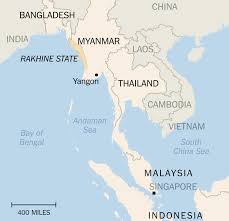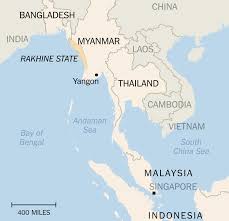
Sparking fears the country could become fertile ground for transnational terror groups, the issue of Muslim marginalization in Myanmar has captivated the attention of Islamic State-inspired extremists.
the Rohingya — an ethnic minority that is predominately Muslim, has been clashing with Buddhist-majority Myanmar for years now. Resulting in a daily average of 35,000 Rohingya Muslim refugees fleeing to neighboring Bangladesh over the last week, according to United Nations figures, due to increased reports of violent attacks on Rohingya villages in the state of Rakhine by security forces and Buddhist civilians, the conflict has recently escalated.
The military crackdown happened after coordinated attacks on 30 government targets in Rakhine by insurgents from the Arakan Rohingya Salvation Army last month. But with the UN Human Rights Commission recently calling the state's treatment of Rohingya a "textbook example of ethnic cleansing", international critics say Yangon's response has been too heavy-handed.
Myanmar’s status as one of Asia’s hottest frontier markets could be destabilized by the crisis. While the World Bank expects economic growth to average 7.1 percent per year, the country attracted more than $3 billion in foreign direct investment during the first four months of the 2017-2018 fiscal year.
The plight of the Rohingya may be exploited by terror networks across Southeast Asia and beyond as the situation worsens and this is one of the new problems emerging there on top of existing troubles.
"The repression visited upon the Rohingya by a powerful government largely consisting of leaders from another religion present a potential, transnational flash-point for jihadi-Salafi organizations," analysts at the Center for Strategic and International Studies said in a recent note, referring to an ultraconservative sect of Islam.
"With parallels to the ethno-religio-nationalist insurgencies of southern Thailand and the southern Philippines, there is legitimate concern that the violence will attract outside forces," the analysts continued.
Southeast Asia's domestic struggles have seen foreign fighters previously flocking there. the analysts pointed out that more than 80 foreign fighters were attracted to a battle between terror group Abu Sayyaf and Philippine armed forces in May this year. They added that opportunities to defend Muslims are inevitably appealing as ISIS-affiliated soldiers seek new missions beyond Syria and Iraq.
Islamic State leader Abu Bakr al-Baghdadi declared that Rakhine was a key region for jihad in 2014.
Rohingya Muslims are also targets for religious radicalization as they live in an environment of systemic discrimination. Yangon denies the group citizenship in addition to restricting marriage, family planning, employment, education and movement as it regards the group, which is nearly one million strong, as illegal migrants.
"The conditions in Rakhine are ripe for the influence of extremist stimuli, including the infiltration of Islamic State ideology, which may worsen the situation in Myanmar," researchers at Singapore-based Nanyang Technological University said in a report. They added that it's an ideal situation for ISIS and affiliates to collaborate with regional groups.
For her failure to end alleged military crimes against the Rohingya, de-facto leader, Nobel Peace Prize recipient Aung San Suu Kyi, is now under a barrage of international criticism.
A rallying call for radical Muslims in Southeast Asia is the Rakhine conflict.
Peter Mumford, Southeast Asia head at political consultancy Eurasia Group, explained in a recent note that hardliners in Indonesia, home to the world's largest Muslim population, are currently using Myanmar's crisis to play into domestic religious tensions.
(Source:www.cnbc.com)
the Rohingya — an ethnic minority that is predominately Muslim, has been clashing with Buddhist-majority Myanmar for years now. Resulting in a daily average of 35,000 Rohingya Muslim refugees fleeing to neighboring Bangladesh over the last week, according to United Nations figures, due to increased reports of violent attacks on Rohingya villages in the state of Rakhine by security forces and Buddhist civilians, the conflict has recently escalated.
The military crackdown happened after coordinated attacks on 30 government targets in Rakhine by insurgents from the Arakan Rohingya Salvation Army last month. But with the UN Human Rights Commission recently calling the state's treatment of Rohingya a "textbook example of ethnic cleansing", international critics say Yangon's response has been too heavy-handed.
Myanmar’s status as one of Asia’s hottest frontier markets could be destabilized by the crisis. While the World Bank expects economic growth to average 7.1 percent per year, the country attracted more than $3 billion in foreign direct investment during the first four months of the 2017-2018 fiscal year.
The plight of the Rohingya may be exploited by terror networks across Southeast Asia and beyond as the situation worsens and this is one of the new problems emerging there on top of existing troubles.
"The repression visited upon the Rohingya by a powerful government largely consisting of leaders from another religion present a potential, transnational flash-point for jihadi-Salafi organizations," analysts at the Center for Strategic and International Studies said in a recent note, referring to an ultraconservative sect of Islam.
"With parallels to the ethno-religio-nationalist insurgencies of southern Thailand and the southern Philippines, there is legitimate concern that the violence will attract outside forces," the analysts continued.
Southeast Asia's domestic struggles have seen foreign fighters previously flocking there. the analysts pointed out that more than 80 foreign fighters were attracted to a battle between terror group Abu Sayyaf and Philippine armed forces in May this year. They added that opportunities to defend Muslims are inevitably appealing as ISIS-affiliated soldiers seek new missions beyond Syria and Iraq.
Islamic State leader Abu Bakr al-Baghdadi declared that Rakhine was a key region for jihad in 2014.
Rohingya Muslims are also targets for religious radicalization as they live in an environment of systemic discrimination. Yangon denies the group citizenship in addition to restricting marriage, family planning, employment, education and movement as it regards the group, which is nearly one million strong, as illegal migrants.
"The conditions in Rakhine are ripe for the influence of extremist stimuli, including the infiltration of Islamic State ideology, which may worsen the situation in Myanmar," researchers at Singapore-based Nanyang Technological University said in a report. They added that it's an ideal situation for ISIS and affiliates to collaborate with regional groups.
For her failure to end alleged military crimes against the Rohingya, de-facto leader, Nobel Peace Prize recipient Aung San Suu Kyi, is now under a barrage of international criticism.
A rallying call for radical Muslims in Southeast Asia is the Rakhine conflict.
Peter Mumford, Southeast Asia head at political consultancy Eurasia Group, explained in a recent note that hardliners in Indonesia, home to the world's largest Muslim population, are currently using Myanmar's crisis to play into domestic religious tensions.
(Source:www.cnbc.com)





